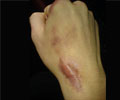In today’s fast pace world it is very difficult to remain calm. Be it children, adults or aged people all are affected by stress. Stress has been
In today’s fast pace world it is very difficult to remain calm. Be it children, adults or aged people all are affected by stress. Stress has been found to influence behavioural patterns, but in a recent study psychological stress has been found to delay healing of physical wounds.
Phillip Marucha, and his colleagues at the University of Illinois at Chicago in a study of laboratory mice, found that psychological stress, brought on by confinement, delayed the closing of wounds by more than 45 percent, reports science portal eurekalert.org.A range of cell and genetic changes accounted for the slow recovery, it said.
"The cells that help remake tissue didn't differentiate the way they would have in normal animals. They didn't line up the way they were supposed to. And they didn't develop the tiny contractile fibres that help pull together the edges of the wound," Marucha said.
Marucha said stress launches a sequence of events that constrict blood vessels and deprives the tissues of oxygen.
"Expression of the gene that codes the protein for those fibres was impaired." However, when the animals received hyperbaric oxygen (oxygen at a greater pressure than atmospheric oxygen), the delay in healing was almost eliminated.
The researchers found that when animals were stressed, expression of the gene increased, presumably to help make more nitric oxide.
Advertisement
Source: Indo-Asian News Service
Advertisement
Everyone experiences variations in mood -- transitory blues, disappointments, the normal grief that accompanies the loss of someone you love. But a severe or prolonged depression that interferes with the ability to function, feel pleasure, or maintain interest is not a mere case of the blues. It is an illness. Researchers have demonstrated that it results from biochemical imbalances in the brain.
For more information read:
http://www.medindia.com/patients/
patientinfo/depression_about.htm











